

Mysterious phone call brought nuclear rivals to the brink after Mumbai. A mysterious night-time telephone call brought India and Pakistan, two nuclear armed countries, to the brink of war at the height of the crisis over the Mumbai terror attacks, it was revealed yesterday.
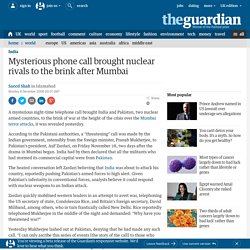
According to the Pakistani authorities, a "threatening" call was made by the Indian government, ostensibly from the foreign minister, Pranab Mukherjee, to Pakistan's president, Asif Zardari, on Friday November 28, two days after the drama in Mumbai began. Indian foreign minister to visit Islamabad for talks. ISLAMABAD: The foreign ministers of Pakistan and India will hold talks in Islamabad next week as the nuclear-armed rivals seek to advance the delicate process of normalising ties.
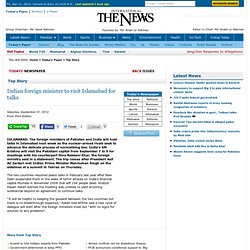
India’s SM Krishna will visit the Pakistani capital from September 7 to 9 for meetings with his counterpart Hina Rabbani Khar, the foreign ministry said in a statement. The trip comes after President Asif Ali Zardari met Indian Prime Minister Manmohan Singh on the sidelines of a summit in Tehran on Thursday. PM Urges Zardari to Stop India-targeted Terrorism. Pushing Pakistan to act against India-directed terrorism, Prime Minister Manmohan Singh on Thursday told President Asif Ali Zardari that expeditious conclusion of the Mumbai terror attack trial in that country will be a "major"Confidence Building Measure in bilateral relations.
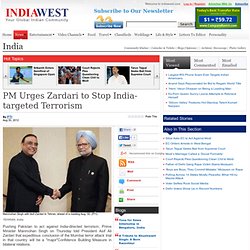
During a meeting between the two leaders that lasted more than half-an-hour, Singh underlined India's terrorism-related concerns. Singh "underlined our terrorism-related concerns” and pressed for an expeditious conclusion of the 26/11 trial. He also said action taken in this sphere (terrorism) would be a major CBM, Foreign Secretary Ranjan Mathai said in a briefing to reporters on the Singh-Zardari meeting on the sidelines of the 16th NAM summit here. Singh was accompanied by External Affairs Minister S.M.
Krishna and other senior officials while Zardari had his son Bilawal Bhutto, Foreign Minister Hina Rabbani Khar and Interior Minister Rehman Malik in his team. Manmohan Singh, Pak PM Gilani may meet on the sidelines of N-summit in Seoul. India and Pakistan: what the most-favoured-nation decision means. Author: Rajiv Kumar, FICCI Pakistan’s decision to grant India most favoured nation (MFN) trading status opens up many potential benefits for both countries; existing trade arrangements will be improved and new opportunities will emerge as bilateral trade is normalised.
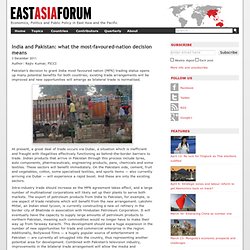
At present, a great deal of trade occurs via Dubai, a situation which is inefficient and fraught with illegalities effectively functioning as behind-the-border barriers to trade. Indian products that arrive in Pakistan through this process include tyres, auto components, pharmaceuticals, engineering products, pans, chemicals and some textiles. These sectors will benefit immediately. On the Pakistani side, cement, fruit and vegetables, cotton, some specialised textiles, and sports items — also currently arriving via Dubai — will experience a rapid boost. At present, there is some justified concern in Pakistan that its local industries will be adversely affected by a surge in exports from India. Indian PM defends Pakistan talks. Indian Prime Minister Manmohan Singh has said his country had no choice but to hold peace talks with Pakistan.
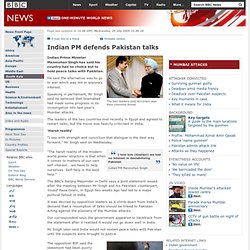
He said the alternative was to go to war which was not in anyone's interest. Speaking in parliament, Mr Singh said he believed that Islamabad had made some progress in its investigation into last year's Mumbai attacks. The leaders of the two countries met recently in Egypt and agreed to restart talks, but the move was heavily criticised in India. 'Harsh reality' "I say with strength and conviction that dialogue is the best way forward," Mr Singh said on Wednesday. "The harsh reality of the modern world power structure is that when it comes to matters of our own self interest… we have to help ourselves. Pakistan, India to exchange nuclear data. ISLAMABAD, Dec. 31 (Xinhua) -- Pakistan and India will exchange lists of nuclear installations and facilities on Saturday in spite of tension over the 2008 Mumbai attacks that has disrupted the dialogue process between the two countries.
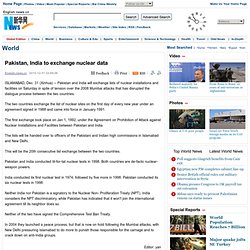
Managing the Danger from Pakistan's Nuclear Stockpile. Pakistan has a large and growing nuclear arsenal.
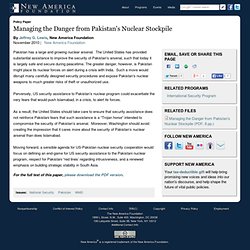
The United States has provided substantial assistance to improve the security of Pakistan’s arsenal, such that today it is largely safe and secure during peacetime. The greater danger, however, is Pakistan might place its nuclear forces on alert during a crisis with India. Such a move would disrupt many carefully designed security procedures and expose Pakistan’s nuclear weapons to much greater risks of theft or unauthorized use. Perversely, US security assistance to Pakistan’s nuclear program could exacerbate the very fears that would push Islamabad, in a crisis, to alert its forces. As a result, the United States should take care to ensure that security assistance does not reinforce Pakistani fears that such assistance is a “Trojan horse” intended to compromise the security of Pakistan’s arsenal. For the full text of this paper, please download the PDF version. OPINION >India-Pakistan should be bhai bhai.
On the Nuclear Threshold - Mozilla Firefox. By Joyce Battle National Security Archive Electronic Briefing Book No. 6 For more information contact: Joyce Battle 202/994-7000 or nsarchiv@gwu.edu Washington, D.C. – This briefing book contains material from the National Security Archive's project on U.S. policy toward South Asia, which is documenting nuclear developments in India and Pakistan from the 1950s to the present.
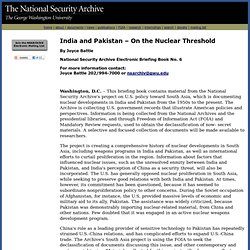
The Archive is collecting U.S. government records that illustrate American policies and perspectives. Information is being collected from the National Archives and the presidential libraries, and through Freedom of Information Act (FOIA) and Mandatory Review requests, used to obtain the declassification of now- secret materials.